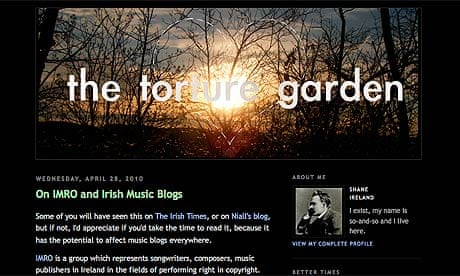The Irish Music Rights Organisation (IMRO) has moved against several of the country's MP3 blogs, demanding licences that threaten to shut down some of Ireland's most-respected music sites. Sites including Nialler9 and the Torture Garden have been asked to pay hundreds of pounds annually to continue sharing songs – most of which are sent to them by the artists and labels themselves.
So far, IMRO has contacted only three blogs, but it plans to widen its net – requiring licences for any site that offers song downloads/streams and "is made available in Ireland". Both the Torture Garden and Asleep on the Compost Heap are amateur blogs that generate no revenue; they have no ads and are hosted on Google's free Blogspot service. The Torture Garden is particularly well-regarded, with earnest writing and original artwork, interviews with acts like Final Fantasy and Peter Bjorn and John, and its spotlight on emerging Irish talent. Nialler9, maintained by Dublin-based journalist Niall Byrne, is four-time winner of the Irish Blog award for best music blog. That site, while just as sincere in its indie evangelism, does take some advertising.
"Let me get this absolutely straight," Byrne wrote yesterday, "I have no problem paying artists royalties if that is required." But for Byrne, there are two issues. First, that most of the downloads on his site are provided by artists, labels and their PR companies. "Like many I thought that MP3s that were cleared by bands and labels for promo were provided as is – gratis and without any attachments or additional requirements ... Y'know, the same way an entire music blogosphere and a digital PR industry has been allowed to grow up over the course of the last 10 years." In the five years Byrne has been blogging, he says "not one band ... has ever mentioned IMRO or royalties to me when asking me to post their music".
For Byrne, the second issue is that IMRO's blanket licence – the Limited Online Exploitation Licence – "doesn't take into account the size of a blog or site". While a site like his would owe £300-600 per year to continue, even tiny sites must pay at least €150 (£130) annually. "Lumping [in] a music blogger who blogs from home in his spare time ... with a professional company is wrong," he wrote. "It will have a destructive effect on the promotion of music online as many bloggers won't be able to afford these fees and as a result bands will have less of an outlet to promote their music."
IMRO is the organisation tasked with collecting and distributing royalty payments for songwriters, composers and music publishers in Ireland, the equivalent of the UK's PRS and the United States' ASCAP. It is not the same as IRMA, which acts on behalf of Irish labels (like the BPI or RIAA). This distinction is the crux of the problem for music blogs like Nialler9. While many artists and labels grant permission for their songs to appear online – sending them to bloggers by post, attaching them to promo emails, advertising them on Twitter or MySpace – they may not, er, be allowed to do this.
"If the composer/author or publisher of a track has mandated a collection society, ie IMRO in Ireland, PRS in the UK etc, to license and collect royalties on their behalf then this licence must be obtained," IMRO told Byrne. "If a composer has mandated us to license or if a track is published then a composer hasn't got the right to give full permission for use of the track."
So far, this hasn't been a problem. For better or for worse, publishing groups were sleeping giants – leaving spats with music bloggers to the recording industry associations. Now, bolstered by massive licensing deals like IMRO's recent agreement with YouTube, they're awakening to possible revenues – and dispatching the lawyers.
"Most people who operate music blogs (this does not include [illegal album download blogs] who somehow remain untouched)," Byrne explained, "are decent people who want to stay on the legit side of the law." But he says the new licence costs are "prohibitive" to those who want to post MP3s "with permission" from their favourite bands.
"Gardenhead", from Asleep on the Compost Heap, was more direct in his language. "Hey I'm no lawyer," he wrote, "but surely Irish music blogs, tending as they do to host single MP3s and promote gigs rather than encouraging the wholesale downloading of albums, should be nurtured – not slapped with some shite about a licence fee that is going to cause half of them to quit in confusion and frustration."
If IMRO goes ahead with its plan, targeting music blogs around the world, there will soon be legions of frustrated bloggers. And it will be much worse if other regional publishers follow suit. While the organisations' hearts may be in the right place – looking to buoy a flagging industry – we just hope they are going about it the right way. Will forcing the closure amateur music blogs make songwriters richer? Or precisely the reverse?

Comments (…)
Sign in or create your Guardian account to join the discussion